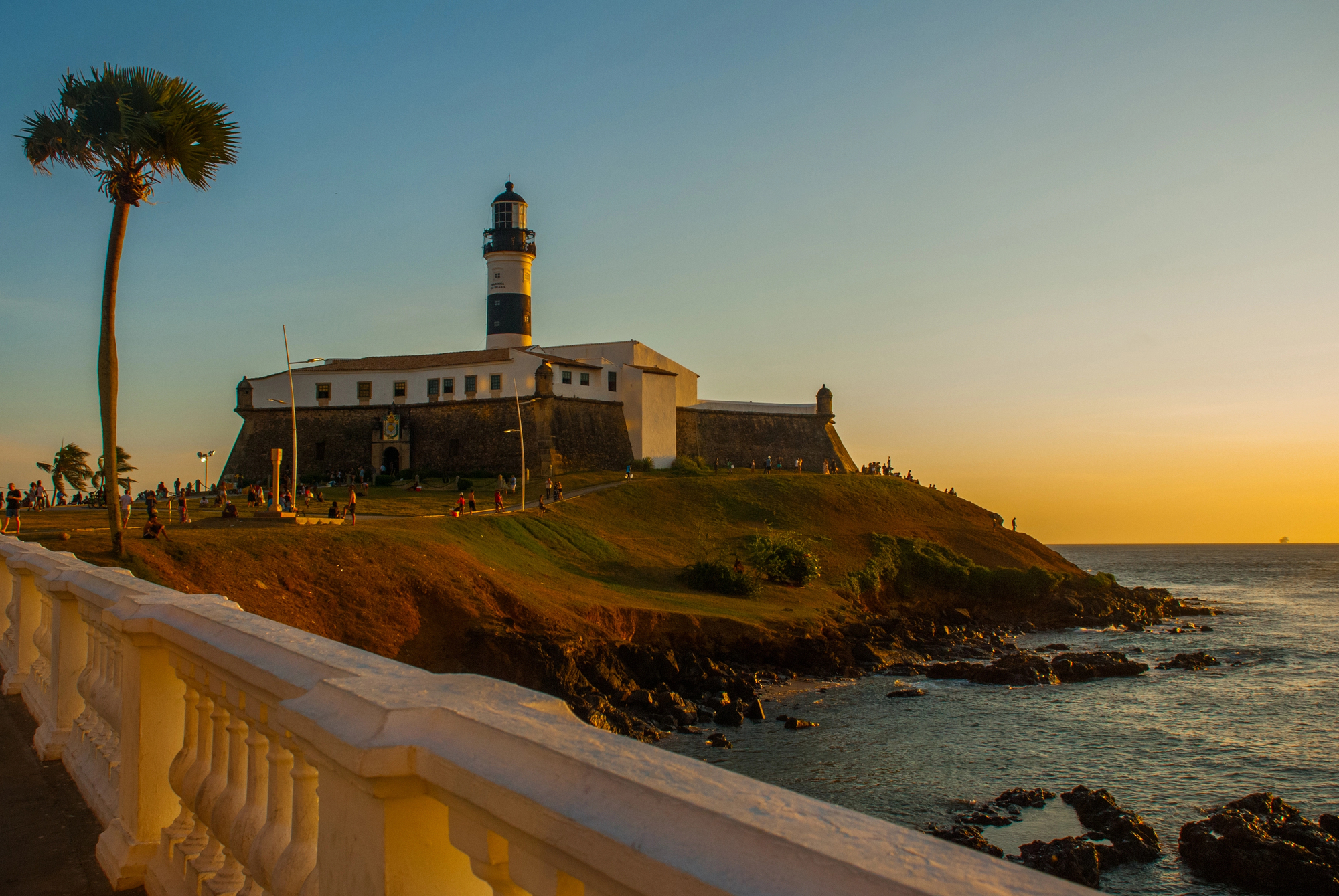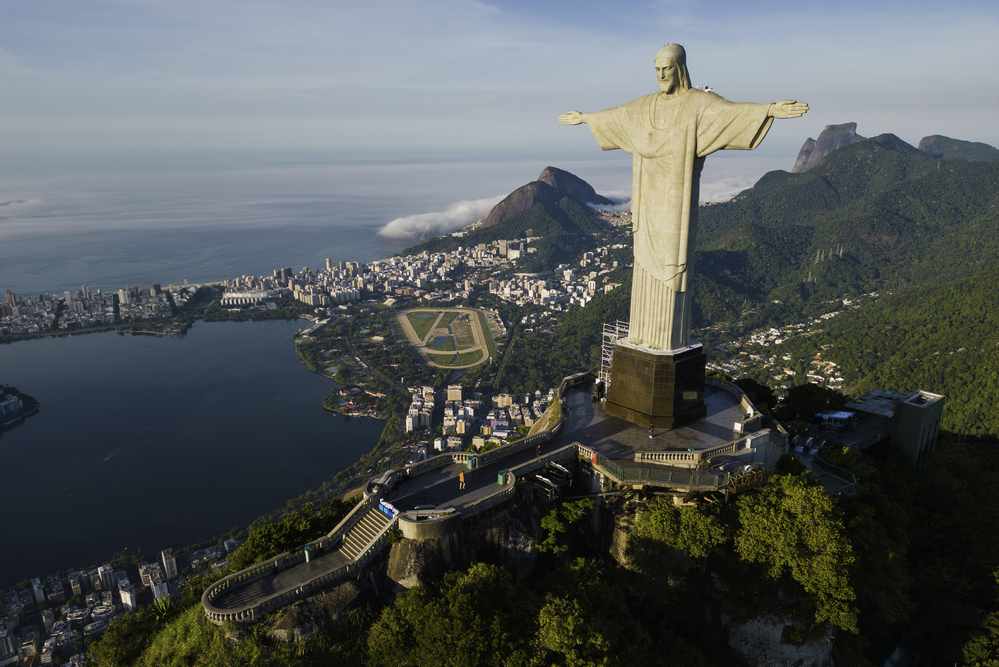Salvador, the capital of Bahia, is one of the most vibrant and charming cities in Brazil. Known for its rich culture, fascinating history, and stunning beaches, the city is a destination that offers something for everyone, with no shortage of things to do in Salvador. For history enthusiasts, Salvador is truly amazing.
What Makes Salvador So Desired by Tourists?
Salvador is a city that radiates energy on every corner. Founded in 1549 as the first capital of Brazil, the city is an open-air museum, full of stories and influences that have shaped the country’s identity.
The Pelourinho, with its cobblestone streets and colorful colonial architecture, is a UNESCO World Heritage Site and one of the city’s greatest symbols, transporting visitors to colonial Brazil.
The city is the cradle of Afro-Brazilian culture, where African traditions are preserved and celebrated through manifestations such as Candomblé, Capoeira, and music. The religious syncretism, which blends elements of Catholicism with African-based religions, is one of the most striking traits of the city, reflected in festivals like the Lavagem do Bonfim.
Another highlight of Salvador is its unique cuisine, which combines ingredients like palm oil, coconut milk, and peppers to create iconic dishes such as moqueca, vatapá, and the famous acarajé. Tasting these delights on the city’s streets is an experience that wins over any visitor.
With its history, vibrant culture, delicious cuisine, and unique hospitality, Salvador is a city that enchants and leaves unforgettable impressions on everyone who visits. It’s simply amazing!
13 Things to Do in Salvador, Brazil
As one of the best places to visit in Brazil, Salvador is one of the most sought-after destinations for tourists. If you’re planning to add Salvador to your itinerary and don’t yet know where to start your sightseeing during your visit to the city, here’s a complete list of things to do in Salvador. Get ready for a journey full of unique experiences and unforgettable memories!
Salvador Carnival
You can’t talk about Salvador without mentioning Carnival. Salvador’s Carnival is the best and most sought-after in Brazil. Several days of celebration culminate in the Carnival holiday, bringing together an enormous crowd.
It’s the largest festival in Brazil, with street celebrations, lots of music, and dancing that draws people from all over the world. Beyond the festive celebration, Carnival holds significant cultural relevance, contributing to the economy, valuing art and entertainment, and offering participants fun, integration, and diversity.
In 2025, Salvador’s Carnival will take place from February 27th to March 4th. If you’re thinking about coming to Brazil to experience an indescribable magical culture filled with intensity and contagious energy, this is one of the top things to do in Salvador.
But if you’re not a fan of large crowds, the pre-Carnival rehearsals start in December, providing an excellent opportunity to enjoy the Carnival experience up close.
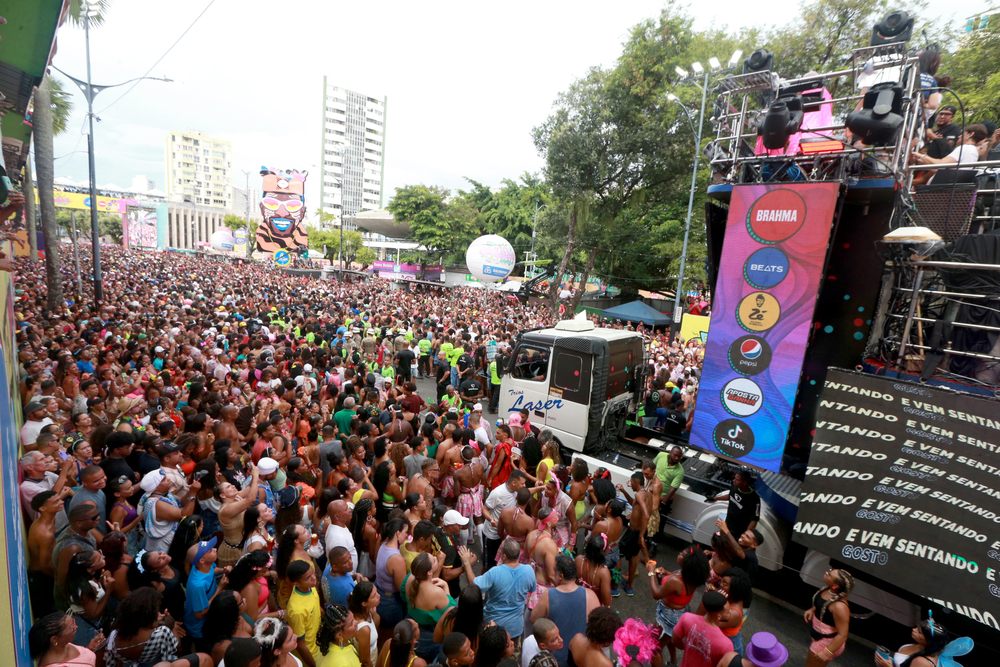
Explore the Pelourinho
The Pelourinho is the historic heart of Salvador. It’s the place where the Portuguese began construction to establish the city, choosing the higher ground as a natural barrier against invaders. Unfortunately, its history carries a somber energy, as it was the site where enslaved people were punished.
Today, this area, spanning from Pelourinho to the historic center, offers tourists plenty of entertainment. With its cobblestone streets, colorful colonial mansions, and ancient churches, the neighborhood provides a dive into Brazil’s colonial past. Things to do in Salvador in Pelourinho that you can’t miss include:
- Church and Convent of São Francisco: Famous for its interior decoration covered in gold.
- Largo do Pelourinho: A perfect spot for taking photos and enjoying the local atmosphere.
- City Museum: An opportunity to learn more about Salvador’s history and culture.
- Jorge Amado Foundation: A space dedicated to the life and work of the famous Brazilian writer.
- Cathedral Basilica of Salvador: A stunning architectural and historical landmark.
At the Pelourinho, you’ll also find several craft shops where you can buy souvenirs for family and friends, as well as restaurants serving typical Bahian dishes, such as acarajé and moqueca. One important tip is that some streets are closed to cars, so set aside a day to explore the area on foot and take in every detail.
It’s best to visit the Pelourinho during the day, when all the shops are open, and the streets are bustling with activity. Avoid going at night, as many shops will be closed, and safety risks may increase.
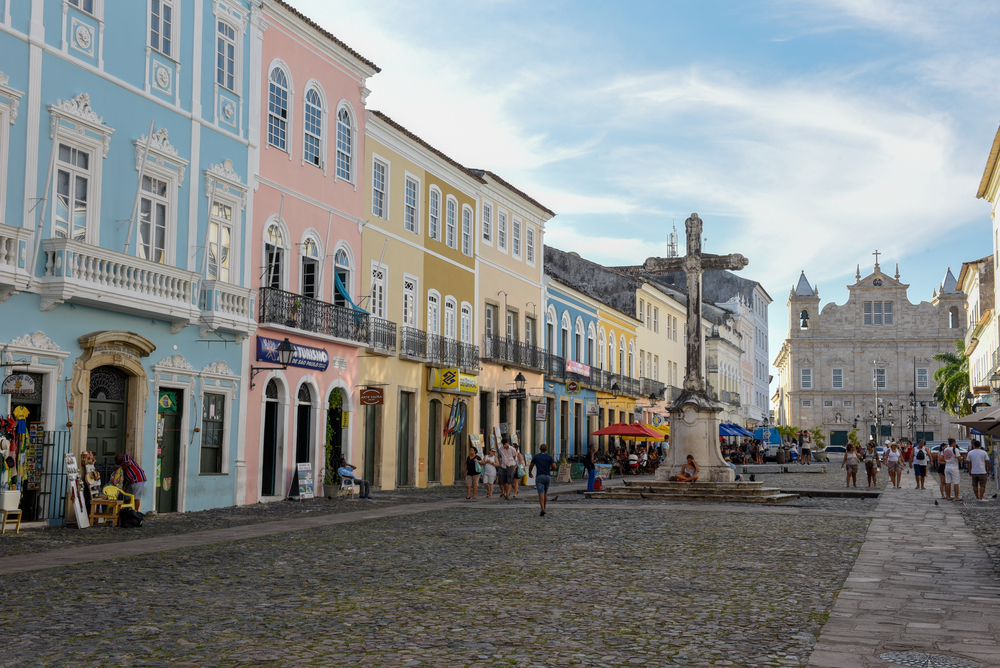
Visit the Mercado Modelo
Located near the Elevador Lacerda, in the lower city, this space houses over 200 stores and was built in 1861 to serve as Salvador’s third customs house. The Mercado Modelo is the perfect place to buy souvenirs from Bahia. Here, you can find:
- Local crafts, such as hammocks, cotton clothing, and jewelry.
- Typical Bahian culinary products, such as peppers and liqueurs.
- Capoeira performances, which are regularly held on site.
When it comes to closing a purchase, don’t forget to negotiate prices with the vendors – it’s a common and expected practice! However, if you just want to explore and enjoy the atmosphere, the location offers a chance to engage with the community through capoeira circles and performances, making it a vibrant cultural meeting point.
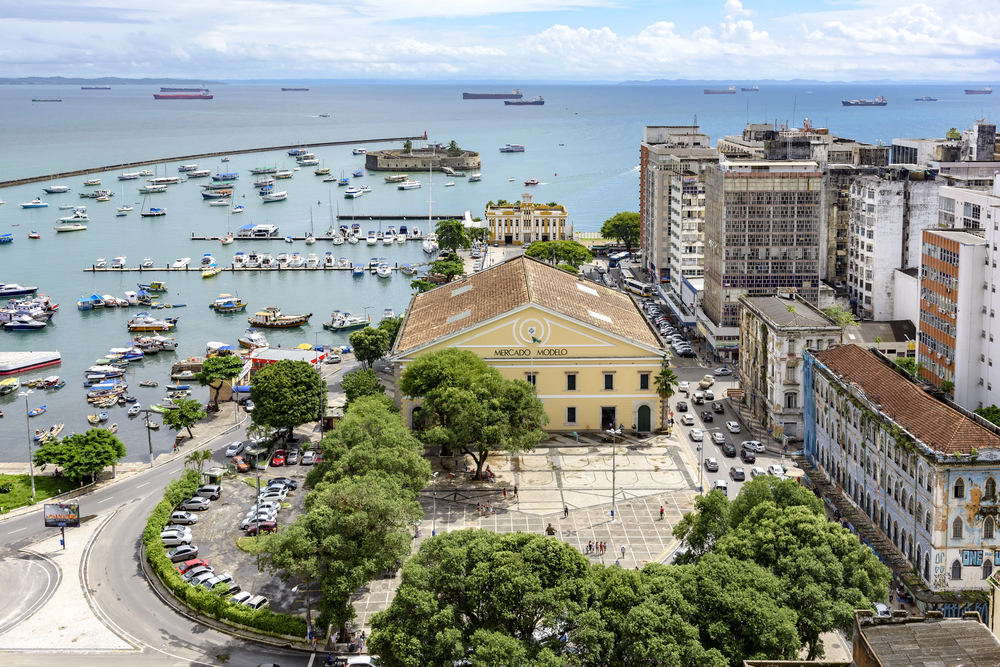
Take the Elevador Lacerda
The Elevador Lacerda is an icon of Salvador. It connects the Upper City (Cidade Alta) to the Lower City (Cidade Baixa) and offers a spectacular view of the Bay of All Saints (Baía de Todos os Santos). For a symbolic cost, you can enjoy one of the best panoramas in the city. It’s not just a tourist attraction; it’s also a means of transportation and the world’s first urban elevator.
The Elevador Lacerda, Pelourinho, and Mercado Modelo are close to each other and can easily be combined into a single-day itinerary. In the Upper City, you’ll find Pelourinho, and in the Lower City, you can explore Mercado Modelo or take a stroll along the pier to admire the beauty of the water.
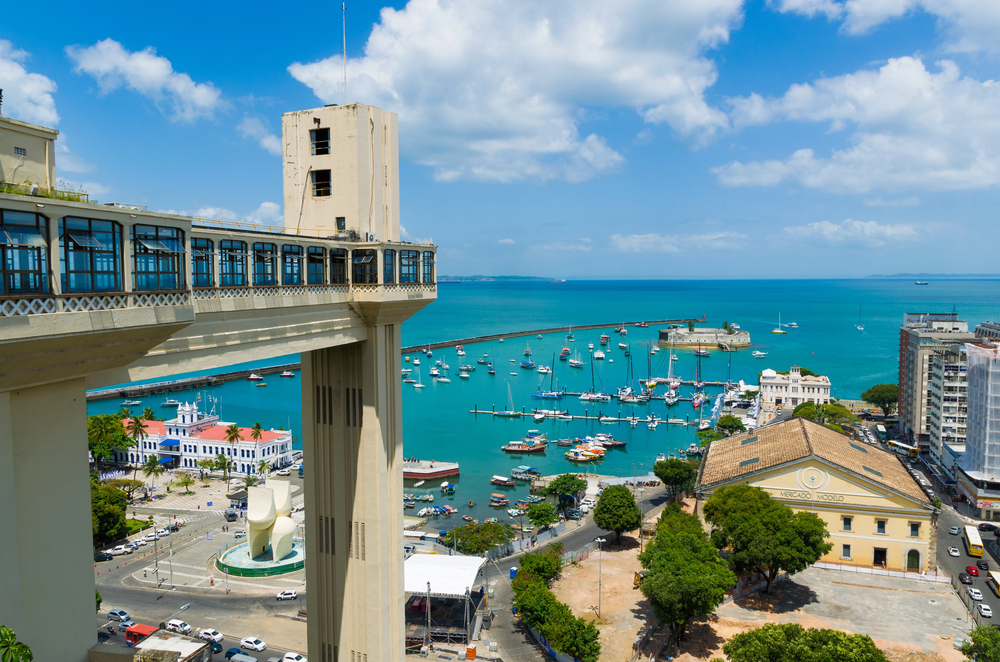
Relax on the Beaches
Salvador is surrounded by urban paradise beaches as well as more secluded ones framed by coconut trees, offering options for every taste. Here are a few you can’t miss:
- Porto da Barra Beach: One of the most popular and historic beaches, with calm waters ideal for swimming.
- Flamengo Beach: A bit farther out and quieter, perfect for those seeking tranquility.
- Itapuã Beach: Immortalized in the song by Vinícius de Moraes, it’s a great spot to relax and enjoy the sunset.
Each beach has its own unique charm, so it’s worth exploring more than one during your stay. Beyond the urban beaches and those around Salvador, you can visit the beaches of nearby islands, ideal for day trips, starting with Ilha dos Frades, Guarajuba, Itacimirim, Praia do Forte, and Imbassaí.
If you’re willing to go a bit farther, Morro de São Paulo is stunning and enchanting. However, it’s necessary to stay at least overnight—or, if you can spend more days, you’ll have time to visit the idyllic island of Boipeba.
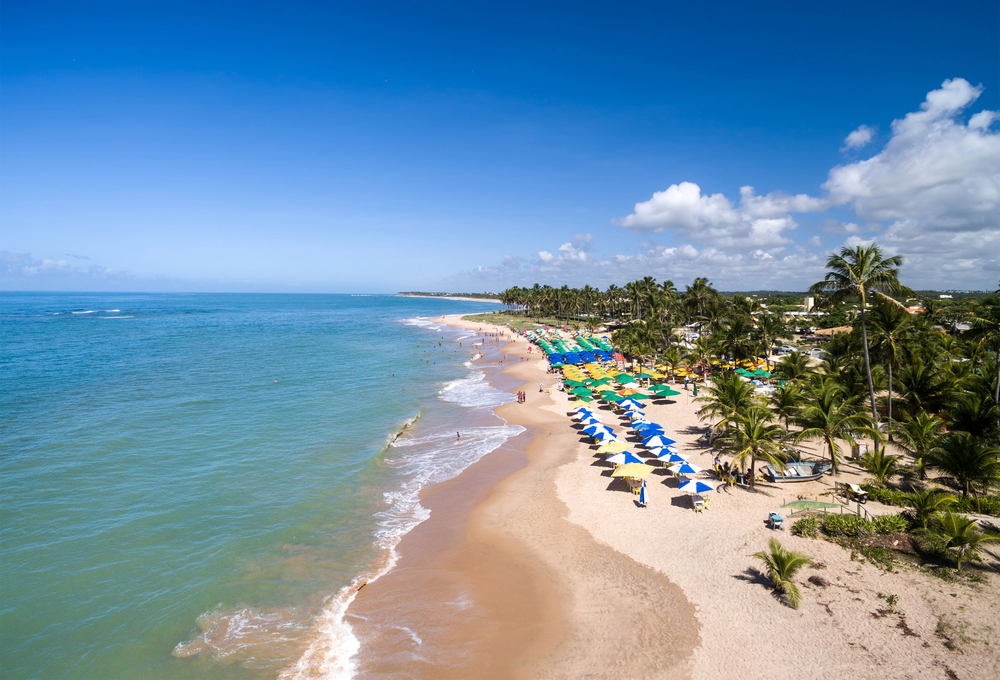
Visit the Farol da Barra
The Farol da Barra (Barra Lighthouse) is one of Salvador’s main tourist attractions. In addition to being a historical site, it houses a museum inside that tells the story of navigation in the region. Built even before the city of Salvador existed, it symbolizes the connection between humans and the sea and is part of the Santo Antônio da Barra Fort.
Next to it is Farol da Barra Beach, one of Salvador’s busiest urban beaches. It’s well-equipped for spending the entire day on the sand, as it features a beachfront restaurant. The sunset at the Farol da Barra is an unforgettable experience that attracts both tourists and locals alike.

Try Bahian Cuisine
One of the essential things to do in Salvador is to try the local cuisine. Bahian gastronomy is heavily influenced by African traditions, becoming a core part of Afro-Brazilian culture. Food is an essential part of the Salvador experience, with palm oil (azeite de dendê) and chili peppers being the two key ingredients. Here are some must-try dishes:
- Acarajé: A deep-fried bean fritter made with palm oil, served with vatapá, shrimp, and chili.
- Moqueca: A seafood or fish stew prepared with coconut milk, palm oil, and spices.
- Bobó de camarão: Made with shrimp, cassava, and coconut milk.
Don’t forget to try the traditional desserts, like cocada (a coconut-based treat) and quindim (a coconut and egg yolk dessert), as well as the refreshing cajá juice.
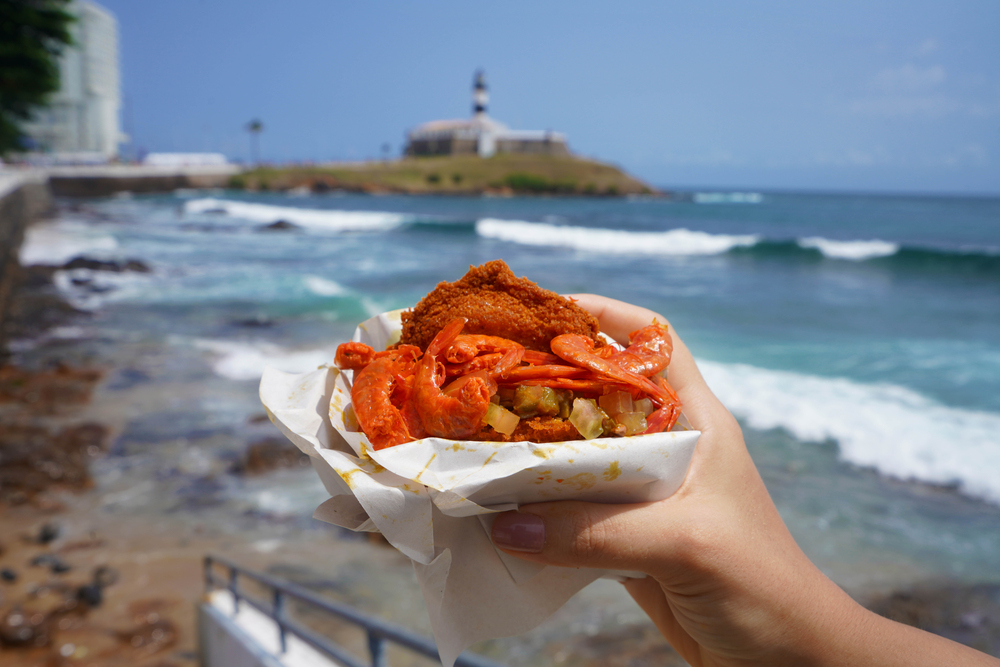
Join a Capoeira Circle
Capoeira is a Bahian cultural tradition that blends martial arts, music, and dance. You can watch or even participate in capoeira circles at various spots around the city, especially in Pelourinho and Mercado Modelo.
If you’re interested in learning, there are schools offering beginner classes. It’s a fantastic way to immerse yourself in the local culture.
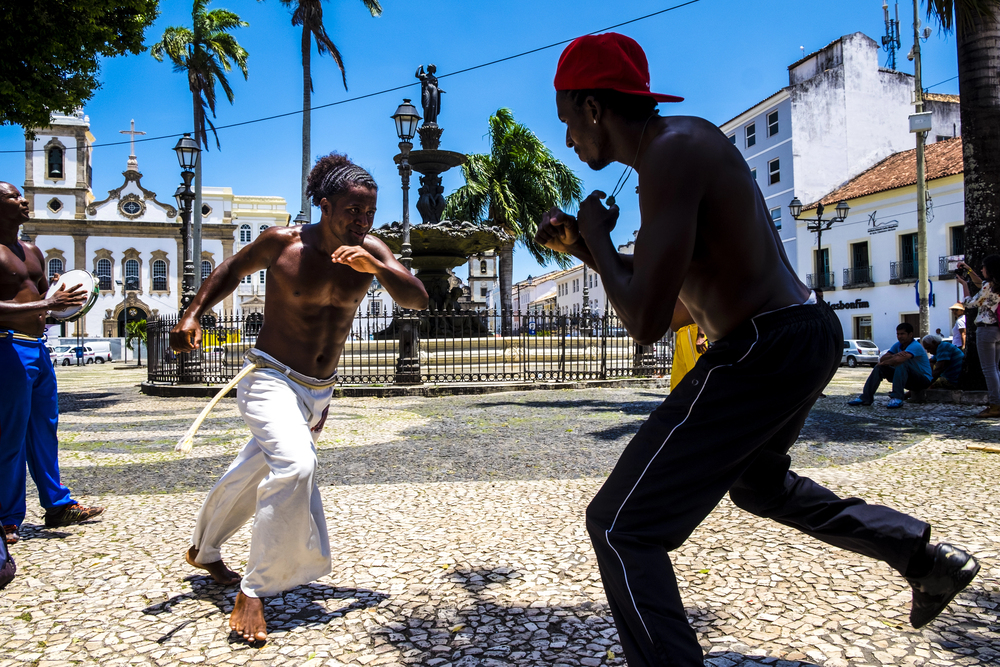
Visit the Dique do Tororó
The Dique do Tororó is a special place in Salvador, famous for its floating sculptures of orixás on the lake. You can walk around the dique, admire the sculptures, and connect with the Afro-Brazilian religion and culture.

Discover History at the Forte de Santo Antônio da Barra
This fort, located near the Farol da Barra, is a historic site that takes you back in time. In addition to its military history, it offers breathtaking views of the coastline and the open sea.

Enjoy Salvador’s Nightlife
Salvador’s nightlife is an unforgettable experience that combines music, dance, gastronomy, and an infectious vibe. Whether in laid-back bars, live music venues, or outdoor events, the capital of Bahia has options to suit all tastes and styles.
The Rio Vermelho neighborhood is the heart of Salvador’s nightlife, known for its bars and restaurants that serve everything from sophisticated cocktails to classic street food. It’s also the perfect spot to try authentic acarajé at the famous baianas’ stalls.
For those seeking cultural experiences, live music performances featuring samba, axé, and forró are common in places like Pelourinho, where the sound of Olodum’s drums resonates through the historic streets. If you’re in the mood for larger events, venues like the Concha Acústica host renowned Brazilian and international artists.
Salvador also delights fans of parties in natural settings, with beachfront luaus in Itapuã or private events on exclusive beaches. The warm climate and Bahian hospitality ensure that every night is unique, filled with energy and joy. In Salvador’s nightlife, one thing is certain: it’s impossible not to fall in love!
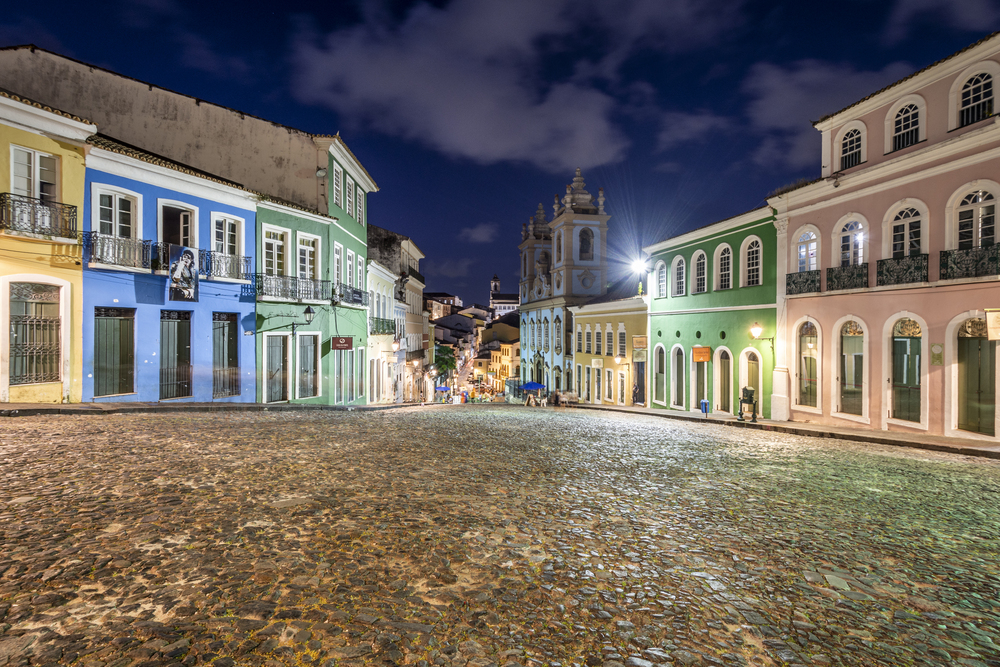
Visit the Igreja do Bonfim
The Igreja do Bonfim is one of the most iconic landmarks in Salvador. Known for its colorful ribbons, which symbolize faith and wishes, the church is a place of devotion and serenity.
If you’re in the city during the right time of year, don’t miss the Lavagem do Bonfim, an annual tradition and cultural event that’s truly unforgettable.

Take a Boat Tour on the Bay of All Saints
The Baía de Todos os Santos (Bay of All Saints) is the largest bay in Brazil and offers breathtaking scenery. Boat tours are an excellent way to explore nearby islands, such as:
- Itaparica Island: Renowned for its calm waters and beautiful beaches.
- Ilha dos Frades: A tranquil paradise, ideal for those seeking peace and a connection with nature.
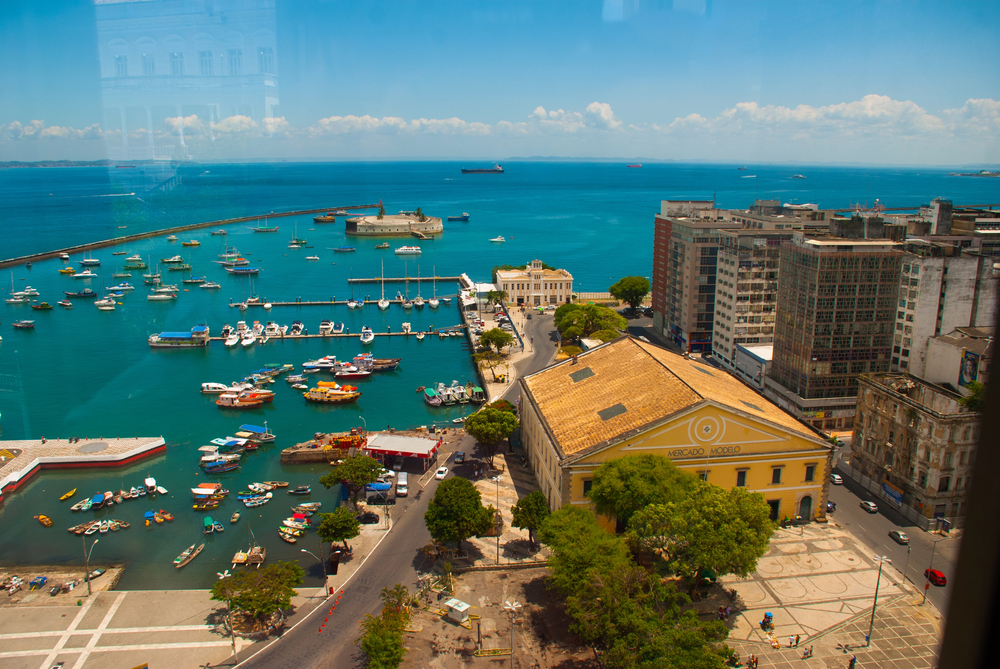
Accommodation in Salvador: Where to Stay in the Bahian Capital
The foundation of your fun starts with choosing your accommodation—it’s important to select wisely to get the most out of your trip. Salvador has a vast hotel network, which can make picking the perfect spot a bit challenging. The upside is that prices are affordable, making it easier to find a great location.
The most tourist-friendly neighborhoods are those near the coastline, between Pelourinho and Rio Vermelho.
Choosing the right place to stay is key to enjoying the best of the city, whether you’re a tourist eager to visit iconic landmarks or someone who prefers to explore the quieter corners of the capital. Here are some tips and recommendations on where to stay in Salvador.
Historic Center: Pelourinho
Pelourinho is one of the most famous destinations in Salvador, perfect for those who enjoy history and want to explore colonial architecture, museums, and churches. Staying here means being surrounded by cobblestone streets, colorful buildings, and constant cultural events. It offers proximity to historical attractions, a wide range of hostels and charming guesthouses, and a vibrant atmosphere. At night, the area can be quieter and less crowded, requiring attention to safety.
Barra
Barra is one of the most sought-after areas by tourists, thanks to its famous beaches, such as Praia do Porto da Barra and Farol da Barra. It is an excellent place for those looking for accommodations near the seafront and a relaxed atmosphere.
Easy access to beaches, good tourist infrastructure, lively nightlife, and proximity to the Barra-Ondina Circuit, famous during Carnival. However, during Carnival and holidays, the area can get very crowded.
Rio Vermelho
Known as Salvador’s bohemian neighborhood, Rio Vermelho is the perfect place for those who want to enjoy nightlife and Bahian cuisine. The area also offers modern and charming hotels, in addition to being well-located. Excellent restaurants, bars, and live music venues, as well as high-quality hotels. Some areas can be noisy at night due to the bustling nightlife.
Itapuã
Immortalized in the song by Vinícius de Moraes and Toquinho, Itapuã is a quieter area surrounded by beautiful beaches, such as Stella Maris. It is ideal for those looking to relax and stay a bit away from the busy city center. Paradise-like beaches, a peaceful atmosphere, and cozy guesthouses. It is a bit distant from the main attractions of the historic center.
Pituba and Caminho das Árvores
If you’re looking for a more modern and well-structured area, Pituba and Caminho das Árvores are good choices. Here, you’ll find business hotels and rental apartments. Strategic location, good options for shopping centers and services. Fewer tourist attractions, and access to beaches can be farther away.
Stella Maris and Flamengo
These beaches in the northern part of Salvador are ideal for those seeking tranquility and a more exclusive environment. This area is popular with families and tourists who prefer to escape the hustle and bustle of the city center. Peaceful atmosphere, clean beaches, and excellent hotel infrastructure. However, it is far from the historic center and the main tourist attractions.
Important Tips:
- Time of Year: During Carnival, accommodation prices skyrocket, and availability runs out quickly, especially in neighborhoods like Barra and Rio Vermelho. Plan ahead!
- Transportation: Salvador experiences heavy traffic during peak hours, so consider the proximity of your lodging to the places you want to visit.
- Budget: Salvador offers everything from affordable hostels and charming guesthouses to luxury resorts. There are options for every budget.
- Safety: As in any large city, it’s important to stay alert to safety, especially in tourist areas and at night.
Salvador is a charming city with accommodation options that cater to all styles and preferences. When planning your stay, consider the type of experience you’re looking for: cultural and historical, relaxing by the sea, or vibrant and full of nightlife. Whatever you choose, the Bahian capital will undoubtedly provide an unforgettable experience!
Is It Worth Visiting Salvador?
With all these tourist attractions to explore, it is undoubtedly worth visiting Salvador, Bahia! The city is rich in history, culture, and natural beauty. You’ll discover the origins of Brazil, where it all began and which still represents our Brazilian culture today.
It’s no wonder that so many people visit Salvador—on top of everything, the joy of the local soteropolitano people is contagious, and interacting with them brings unforgettable energy. There is no shortage of things to do in Salvador, this wonderful city that gave birth to our Brazil.
How Many Days to Spend in Salvador?
With so many incredible things to do in Salvador, it’s a good idea to plan a trip of 3 to 5 days to enjoy everything at a relaxed pace. For a basic experience, 3 days are enough, but ideally, you should set aside at least 5 days to fully explore Salvador, including some time to relax on the beaches.
If you have more than a week, you’ll be able to fully immerse yourself in Bahian culture and even visit nearby destinations. No matter how much time you have, Salvador will certainly leave you with unforgettable memories!
When to Visit Salvador
Before planning your trip, it is always important to research what to know before coming to Brazil. This, of course, includes evaluating the best time to visit. It’s important to choose the right time to visit Salvador, depending on what you’re looking for. Here are the best times to visit Salvador, along with some helpful tips:
Salvador in Summer (December to March)
Summer is the high season in Salvador and undoubtedly the busiest period. With plenty of sunshine, crowded beaches, and traditional parties, this is the perfect time for those seeking energy, music, and fun. This is also when the Salvador Carnival takes place, one of the most famous in the world, attracting crowds with its electric trios and street blocks. It usually occurs between February and March.
The weather features sunny days with average temperatures ranging from 25°C to 31°C, ideal for enjoying beaches like Porto da Barra, Itapuã, and Stella Maris. January and February are marked by traditional events such as the Lavagem do Bonfim and the Festa de Iemanjá.
For travelers looking for excitement, cultural festivities, and intense sunshine, this is the perfect time to visit the Bahian city. However, since it’s high season, prices for everything are higher, and tourist spots can be very crowded.
Salvador in Spring (September to November)
Spring is one of the best times to visit Salvador. The weather is pleasant, with average temperatures between 23°C and 29°C, and the tourist activity is still moderate. This means milder weather, less rain, and quieter, less crowded beaches. It’s an ideal time to explore the Historic Center, such as Pelourinho, without facing large crowds. This is the perfect season for families, couples, and anyone who prefers a more relaxed experience.
Salvador in Autumn (April to June)
Autumn marks the beginning of the low season in Salvador, with pleasant temperatures and a more laid-back atmosphere. It’s a great option for those looking to save money, as accommodation prices are more affordable, and the weather remains warm, with temperatures between 22°C and 28°C.
It’s an excellent time to visit historical and cultural attractions with fewer lines. If you’re on a budget or want to avoid mass tourism, this is a good time to plan your trip. However, keep in mind that there is a chance of moderate rainfall, especially in May.
Salvador in Winter (July to August)
Winter in Salvador is milder compared to other regions of Brazil. Despite occasional rain, it’s still possible to enjoy the city, especially if you’re not seeking intense sunshine.
Temperatures are pleasant, ranging from 21°C to 27°C, making it a good time to explore the Mercado Modelo, the Elevador Lacerda, and the Farol da Barra. Additionally, there are fewer tourists, ensuring a more tranquil experience.
Extra Tips for Choosing When to Visit Salvador
- High Season: December to March and long holidays. Ideal for those seeking excitement and festivities, but be prepared to pay higher prices.
- Low Season: April to November. A great choice for those who prefer affordability and tranquility.
- General Climate: Salvador has a tropical climate, with year-round warmth. Even in winter, temperatures remain pleasant.
- Special Events: Check the city’s cultural calendar. Festivals like the Spring Festival in September also offer unique experiences.
Salvador is a destination that can be visited any time of the year, but choosing the right period depends on the type of experience you’re looking for. The Bahian capital is a city full of life, history, and natural beauty.
Every corner has something unique to offer, and your visit will undoubtedly be unforgettable. As you explore these spots, you’ll understand why Salvador is so beloved by those who visit. Enjoy your trip, as there’s no shortage of things to do in Salvador!
